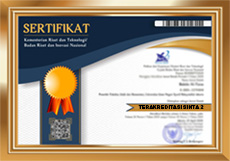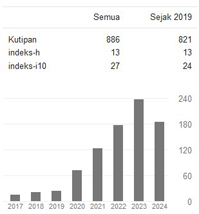SUMBANGAN ETIS MODEL BISNIS EKONOMI SIRKULAR TERHADAP PEMBANGUNAN YANG BERKELANJUTAN: EKSPLORASI KUALITATIF SISTEMATIK
Abstract
This study investigated the relationship between the circular economy amid the Covid-19 pandemic and Christian ethics using the latest literature in management, business ethics, and Christian ethics. Recently, many studies have been conducted on the circular economy, which is seen to be an alternate form of economic activity that benefits the underprivileged and the natural environment. However, it appears that the ethical implications of this circular economy have gotten limited attention. Christian ethics, especially the Catholic Social Teachings, provides a source of inspiration for the sustainable development of economic thought. The data analysis method used in this study was bibliometric analytical procedures, which involved collecting articles from Scopus, Google Scholar, and CrossRef databases. VOSviewer software was used to map keywords from these papers in order to identify research gaps in the region to be investigated. In addition, a qualitative analysis of the selected papers using the Atlas.ti program version 9 highlights the quantitative findings and delves deeper into the research themes. This research indicated that discussions about the circular economy are still mostly unrelated to aspects of ethics, morality, and religiosity, implying that more research is needed to go deeper into those areas.
Key words: Catholic Social Teaching, bibliometric, circular economy, Christian ethics, Covid-19.
Full Text:
PDFReferences
Baliga, Ravindra, Rakesh D. Raut, dan Sachin S. Kamble. “Sustainable Supply Chain Management Practices and Performance: An Integrated Perspective from a Developing Economy.” Management of Environmental Quality: An International Journal 31, no. 5 (2019): 1147–1182.
Blomsma, Fenna, dan Geraldine Brennan. “The Emergence of Circular Economy: A New Framing Around Prolonging Resource Productivity.” Journal of Industrial Ecology 21, no. 3 (2017): 603–614.
Dewick, Paul, Jose Pineda, dan Ronnie Ramlogan. “Hand in Glove? Processes of Formalization and the Circular Economy Post-COVID-19.” IEEE Engineering Management Review 48, no. 3 (2020): 176–183.
Dokpen, KWI. Ekonomi Fransiskus. Membangun Narasi akan Tata Ekonomi Baru. Jakarta, 2020.
van Eck, Nees Jan, dan Ludo Waltman. “Software Survey: VOSviewer, A Computer Program for Bibliometric Mapping.” Scientometrics 84, no. 2 (2010): 523–538.
Eck, Nees Jan Van, dan Ludo Waltman. “Visualizing Bibliometric Networks.” In Measuring Scholarly Impact, diedit oleh Y. Ding, R. Rousseau, dan D. Wolfram, 285–320. Cham: Springer, 2014.
Ferasso, Marcos, Tatiana Believa, Sascha Kraus, Thomas Clauss, dan Domingo Ribeiro-Soriano. “Circular Economy Business Models: The State of Research and Avenues Ahead.” Business Strategy and the Environment 29, no. 8 (2020): 3006–3024.
Geissdoerfer, Martin, Paulo Savaget, Nancy M.P. Bocken, dan Erik Jan Hultink. “The Circular Economy – A New Sustainability Paradigm?” Journal of Cleaner Production 143 (2017): 757–768. http://dx.doi.org/10.1016/j.jclepro.2016.12.048.
Giudice, Fabio, Rocco Caferra, dan Piergiuseppe Morone. “COVID-19, the Food System and the Circular Economy: Challenges and Opportunities.” Sustainability 12, no. 19 (2020): 1–15.
Gupta, Himanshu, Ashwani Kumar, dan Pratibha Wasan. “Industry 4.0, Cleaner Production and Circular Economy: An Integrative Framework for Evaluating Ethical and Sustainable Business Performance of Manufacturing Organizations.” Journal of Cleaner Production 295 (2021): 126253. https://doi.org/10.1016/j.jclepro.2021.126253.
Ibn-Mohammed, T., K. B. Mustapha, J. Godsell, Z. Adamu, K. A. Babatunde, D. D. Akintade, A. Acquaye, et al. “A Critical Eeview of the Impacts of COVID-19 on the Global Economy and Ecosystems and Opportunities for Circular Economy Strategies.” Resources, Conservation and Recycling 164, no. September 2020 (2021): 105169.
Inigo, Edurne A., dan Vincent Blok. “Strengthening the Socio-Ethical Foundations of the Circular Economy: Lessons from Responsible Research and Innovation.” Journal of Cleaner Production 233(2019): 280–291. https://doi.org/10.1016/j.jclepro.2019.06.053.
Iordachi, Victoria, Angela Timuș, dan Stela Ciobu. The Role of Circular Economy Principles in New Pandemic Realities. Implicațiile economice și sociale ale pandemiei COVID-19:analize, prognoze și strategii de atenuare a consecințelor. Chisinau, 2019. https://ibn.idsi.md/vizualizare_articol/116621.
Kirchherr, Julian, Denise Reike, dan Marko Hekkert. “Conceptualizing the Circular Economy: An Analysis of 114 Definitions.” Resources, Conservation and Recycling 127, no. September (2017): 221–232.
Lehtokunnas, Taru, Malla Mattila, Elina Närvänen, dan Nina Mesiranta. “Towards a Circular Economy in Food Consumption: Food Waste Reduction Practices as Ethical Work.” Journal of Consumer Culture (2020): 1–19.
Lewandowski, Mateusz. “Designing the Business Models for Circular Economy - Towards the Conceptual Framework.” Sustainability (Switzerland) 8, no. 1 (2016): 1–28.
Meahjohn, Inshan, dan Prakash Persad. “The Impact of COVID-19 on Entrepreneurship Globally.” Journal of Economics and Business 3, no. 3 (2020): 1165–1173.
Merli, Roberto, Michele Preziosi, dan Alessia Acampora. “How Do Scholars Approach the Circular Economy? A Systematic Lliterature Review.” Journal of Cleaner Production 178 (2018): 703–722. https://doi.org/10.1016/j.jclepro.2017.12.112.
Miharja, Marjan, Sri Setiawati, dan Amanda Lestari Putri Lubis. “How Dangerous the Indonesian Recession Due to COVID-19 Pandemic: Review Policy and Strategy to Recovery.” International Journal of Social Sciences and Humanities 4, no. 3 (2020): 121–129.
Millar, Neal, Eoin McLaughlin, dan Tobias Börger. “The Circular Economy: Swings and Roundabouts?” Ecological Economics 158, no. April 2018 (2019): 11–19.
Morán, Jesús, dan Amelia J. Uelmen. “Business, Faith, and the Economy of Communion.” Journal ofReligion and Society, no. Supplement 22 (2020): 27–48.
Murray, Alan, Keith Skene, dan Kathryn Haynes. “The Circular Economy: An Interdisciplinary Exploration of the Concept and Application in a Global Context.” Journal of Business Ethics 140, no. 3 (2017): 369–380.
———. “The Circular Economy: An Interdisciplinary Exploration of the Concept and Application in a Global Context.” Journal of Business Ethics 140, no. 3 (2017): 369–380.
Muzakki, Fadlan. “The Global Political Economy Impact of Covid-19 and the Implication to Indonesia.” Journal of Social Political Sciences 1, no. 2 (2020): 76–93.
Nandi, Santosh, Joseph Sarkis, Aref Aghaei Hervani, dan Marilyn M. Helms. “Redesigning Supply Chains using Blockchain-Enabled Circular Economy and COVID-19 Experiences.” Sustainable Production and Consumption 27 (2021): 10–22. https://doi.org/10.1016/j.spc.2020.10.019.
Olivia, Susan, John Gibson, dan Rus’an Nasrudin. “Indonesia in the Time of Covid-19.” Bulletin of Indonesian Economic Studies 56, no. 2 (2020): 143–174.
Paletta, Angelo. “Rethinking Economics in a Circular Way in the Light of Encyclical ‘Laudato Sì.’” In Sustainability and the Humanities, diedit oleh Walter Leal Filho dan Adriana Consorte McCrea, 339–357. Hamburg: Springer, 2018.
———. “Rethinking Economics in a Circular Way in the Light of Encyclical ‘Laudato Sì.’” In Sustainability and the Humanities, diedit oleh W. Leal Filho dan A. Consorte McCrea, 339–357.
Springer International Publishing, 2019. http://dx.doi.org/10.1007/978-3-319-95336-6_19.
Philippon, Daniel J. “Sustainability and the Humanities: An Extensive Pleasure.” American Literary History 24, no. 1 (2012): 163–179.
Pla-Julián, Isabel, dan Sandra Guevara. “Is Circular Economy the Key to Transitioning towards Sustainable Development? Challenges from the Perspective of Care Ethics.” Futures 105, no. January (2019): 67–77.
Pomponi, Francesco, dan Alice Moncaster. “Circular Economy for the Built Environment: A Research Framework.” Journal of Cleaner Production 143 (2017): 710–718. http://dx.doi.org/10.1016/j.jclepro.2016.12.055.
Porral, Cristina Calvo, dan Jean-Pierre Levy Mangin. “The Circular Economy Business Model: Examining Consumers’ Acceptance of Recycled Goods.” Administrative Sciences 10, no. 2 (2020): 28.
Qiao, Farong, dan Nan Qiao. “Circular Economy: An Ethical and Sustainable Economic Development Model.” Prakseologia 154 (2013): 253–272.
———. “Circular Economy: An Ethical and Sustainable Economic Development Model.” Prakseologia 154 (2013): 253–272.
Schroeder, Patrick, Kartika Anggraeni, dan Uwe Weber. “The Relevance of Circular Economy Practices to the Sustainable Development Goals.” Journal of Industrial Ecology 23, no. 1 (2019): 77–95.
Shayganmehr, M, A Kumar, J A Garza-Reyes, dan Abdul Moktadir. “Industry 4.0 Enablers for a Cleaner Production and Circular Economy within the Context of Business Ethics: A Study in a Developing Country.” Journal of Cleaner … (2020).
Sillanpää, Mika, dan Chaker Ncibi. “Full ‘circular’ ahead.” In The Circular Economy, 313–328. Elsevier, 2019.
Sörlin, Sverker. “Environmental Humanities: Why Should Biologists Interested in the Environment Take the Humanities Seriously?” BioScience 62, no. 9 (2012): 788–789.
Su, Biwei, Almas Heshmati, Yong Geng, dan Xiaoman Yu. “A review of the circular economy in China: Moving from rhetoric to implementation.” Journal of Cleaner Production 42, no. March (2013): 215–227.
Urbinati, Andrea, Davide Chiaroni, dan Vittorio Chiesa. “Towards a New Taxonomy of Circular Economy Business Models.” Journal of Cleaner Production 168 (2017): 487–498. http://dx.doi.org/10.1016/j.jclepro.2017.09.047.
DOI: http://dx.doi.org/10.31385/jl.v20i2.253.259-276
Refbacks
- There are currently no refbacks.

This work is licensed under a Creative Commons Attribution-NonCommercial-ShareAlike 4.0 International License.

Copyright© 2015 JURNAL LEDALERO This work is licensed under a Creative Commons Attribution-NonCommercial-ShareAlike 4.0 International License.
Institut Filsafat dan Teknologi Kreatif Ledalero Jalan Trans Maumere-Ende - Sikka - Flores - Nusa Tenggara Timur - Indonesia Telp/Fax: 0382 2426535










